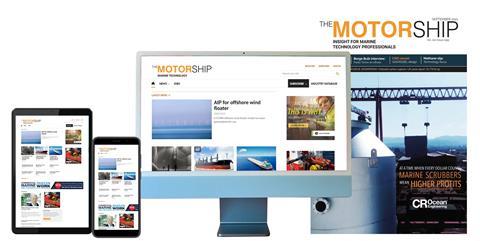- News
- Subscribe

Get full access to The Motorship content
Including the digital magazine, full news archive, podcasts, webinars and articles on innovations and current trends in the shipping industry.
- Expert analysis and comment
- Unlimited access to in-depth articles and premium content
- Full access to all our online archive
Alternatively REGISTER for website access and sign up for email alerts
- White Papers
- Industry Database
- Events

Propulsion & Future Fuels Conference 2025
The Motorship’s Propulsion & Future Fuels is the leading international conference on powering shipping’s emissions-cutting ambitions.
The 2025 Conference will take place from 25th - 27th November in Hamburg, Germany and will offer a meeting place to learn, discuss and knowledge-share the latest developments in efficient power and propulsion technology plus alternative low flashpoint and low carbon fuels.
Click here for more information
Fuel cell advances help boost long-term competitiveness

Fuel cells aren’t likely to out-compete combustion engines any time soon, but their future is still bright.
In May this year, a group of stakeholders led by the Mærsk Mc-Kinney Møller Center for Zero Carbon Shipping published their research into the viability of fuel cells in the report: Fuel Cell Technologies and Applications for Deep-Sea Shipping. The focus was on replacing diesel generators with a fuel cell as the authors believe it appears unrealistic to assume that fuel cells will compete with or entirely replace internal combustion engines in the short term. Rather, it seems more likely that different technologies will co-exist for the foreseeable future due to the high initial costs currently associated with fuel cells and the adjustments that would be required in ships’ engine room design and standard operating procedures for crews.
The investigation involved a desktop study of an 82,000dwt bulk carrier, an LR2 tanker, and a 15,000 TEU container ship. The fuel cell configurations considered were liquid hydrogen fuel for a PEM fuel cell, methanol fuel reformed for a PEM fuel cell, and methane fuel for an SOFC. These options were compared to generators running on either LSFO, bio-methanol, or bio-methane.
Continue this article…
Already subscribed? SIGN IN now

Register for a FREE one-month trial to continue this article
Want to read more before deciding on a subscription? It only takes a minute to sign up for a free account and you’ll get to enjoy:
- Weekly newsletters providing valuable news and information on the shipping sector
- Full access to our news archive
- Live and archived webinars, podcasts and videos
- Articles on innovations and current trends in the shipping industry
- Our extensive archive of data, research and intelligence
Get more free content sign up today
Ready to subscribe? Choose from one of our subscription packages for unlimited access!

